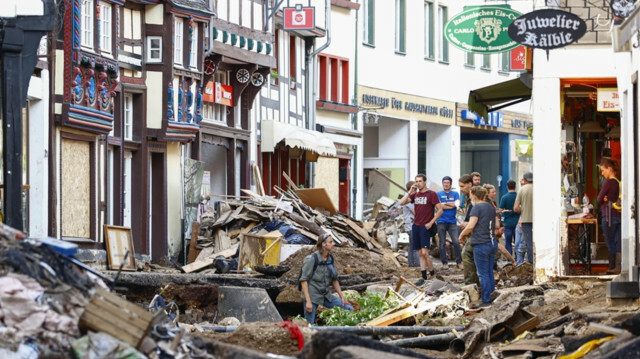
After devastating floods in Western Europe, more disasters may be on doorstep amid nearing winter, say climate experts
Three months after deadly floods swept through Western Europe, experts warn that natural disasters may become more frequent and diverse in the future.
"The climate models predict floods in the north, droughts in the south. We will see more of the floods, the droughts, the heat waves and the forest fires," said Christian Egenhoger of the Brussels-based Center for European Policy Studies (CEPS).
"This is not a thing which happens from today to tomorrow, it is a development that goes over decades," Egenhoger told Anadolu Agency, adding: "We would expect these floods to come more often."
He also urged people to avoid building in flood areas and governments to introduce certain prohibitions to prevent the destructive effects of possible disasters.
With dozens of buildings destroyed and thousands more damaged, disaster areas in the region still bear the scars of the unprecedented midsummer floods that left at least 37 people dead and more than 100 missing in Belgium, while over 150 were killed and 650 injured in Germany.
Volunteers and non-governmental organizations continue to distribute food and basic needs to the public in relief efforts, with many households still unable to receive natural gas.
Fears of another disaster in these areas have mounted amid the approaching winter and an expected increase in precipitation.
Ahead of the COP26 summit in Glasgow, many are concerned about the effectiveness of the decisions taken to combat climate change in reversing the current situation.
Henri Robert from the International Polar Foundation, also based in Brussels, warned that Europe would face many droughts, as will the rest of the Mediterranean Sea region, in the coming period.
"All this area will be much drier and have a lot less rainfall, while other places in Europe, which are affected more by the Atlantic Ocean, will have a much more humid climate with a lot of precipitation as we observed terrible floods this year in July in western Germany and in Belgium," Robert said.
"The problem is, they will happen more and more often," Robert warned.
He urged people to use all the objects they have, including transportation, clothing, cell phones, and computers, less to decrease the negative impact of environmental crises.
* Writing by Zehra Nur Duz

